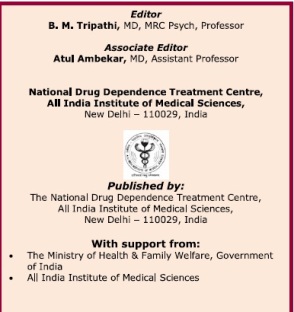
Psychoactive substances have always had a controversial position in the human civilisation. while use of these substances has always been a part of the human history, such use was always regulated and controlled by formal and informal means by the society.
More details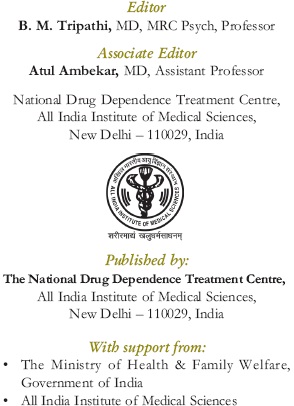
‘Street children’ are visible everywhere – selling books, picking rags, polishing boots. Yet people have little idea of what their lives are like, what choices they make, what they like and how they see their future. They are often treated as a ‘problem of the society’, which requires a solution. In the last two decades, the subject of ‘street children’ has captured enormous attention
More details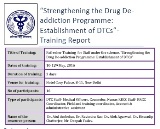
The training program opened with registration of all the participants. All the participants were asked to fill their database forms, which contains their personal information with the qualification/experiences, and also to fill in a pre- training assessment proforma in order to ascertain their current level of understanding about drug use and its management. Subsequently,
More details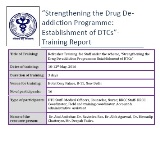
The two volunteers from day 1 presented the recap of the previous day’s sessions. The focus of day 2 was to give the participants an understanding of opioid use disorders and its management. The first session was an overview on opioids and its pharmacology. The second session focused on injecting drug use, its epidemiology, complications and HIV
More details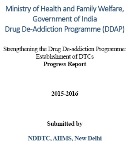
In India, the demand reduction for alcohol and drug use is the mandate of primarily two ministries of the union government, (a) Ministry of Social Justice and Empowerment (MSJE) and (b) Ministry of Health and Family Welfare – through its Drug De-Addiction Program (DDAP). While the MSJE program is implemented by NGOs, the DDAP provided a one-time grant to establish about 124 De- addiction centres (DACs) in various Government district hospitals and psychiatry departments of medical colleges
More details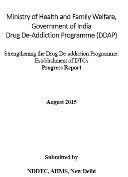
Institutions / hospitals which will participate in this activity in the current financial year (2014- 2015) were informed of this initiative. Subsequently the heads / in-charge of these institution provided their agreements. Additionally these institutions (listed below) also underwent a ‘feasibility assessment’. A total of five DTCs were envisaged to be made functional in 2014-15.
More details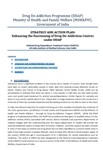
The operational aspects of the entire programme have been described below. The programme will be managed, implemented and coordinated by the National centre, (NDDTC, AIIMS), through specific, earmarked grant provided by the DDAP, MOH&FW.
More details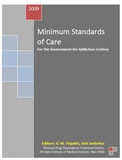
Substance use disorder is best conceptualized as a chronic, non-communicable disease. The disorder requires a comprehensive treatment, delivered by trained professionals, belonging to various disciplines, in a variety of settings. Consequently there is always scope for disagreement regarding what constitutes standard treatment for substance use disorder.
More details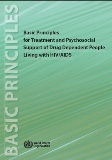
The human rights of drug dependent people living with HIV/AIDS should be fully respected to ensure their appropriate treatment and psychosocial support. They should not be subjected to stigma or discrimination because of their past or present drug use, health status...
More details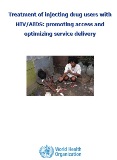
In a number of regions, HIV/AIDS epidemics are being drive by injection drug use. Managginh the multiple problem that stem from both HIV/AIDS and IDU within a population is challenging.
More details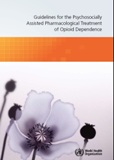
Oral methadone liquid and sublingual buprenorphine tablets are the medications most widely used for opioid agonist maintenance treatment. In the context of high-quality, supervised and well-organized treatment services, these medications interrupt the cycle of intoxication and withdrawal, greatly reducing heroin and other illicit opioid use, crime and the risk of death through overdose.
More details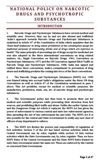
Narcotic Drugs and Psychotropic Substances have several medical and scientific uses. However, they can be and are also abused and trafficked. India's approach towards Narcotic Drugs and Psychotropic Substances is enshrined in Article 47 of the Constitution of India which mandates that the ‘State shall endeavour to bring about prohibition of the consumption except for medicinal purposes of intoxicating drinks and of drugs which are injurious to health’
More details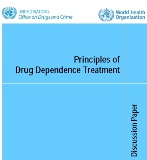
This discussion paper aims to encourage Governments and other partners to take concerted action for the implementation of evidence-based drug dependence treatment services, which respond to the needs of their populations. Given the scale of the problem in most societies and the limited resources available, a clear and coherent approach to service planning is required. There is a need to develop services that can reach the maximum number of individuals and have the greatest impact at lowest cost.
More details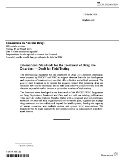
The International Standards for the Treatment of Drug Use Disorders (Standards) were prepared by UNODC and WHO to support Member States in the development and expansion of treatment services that offer effective and ethical treatment. The goal of such treatment is to reverse the negative impact that persisting drug use disorders have on the individual and to help them achieve as full recovery from the disorder as possible and to become a productive member of their society
More details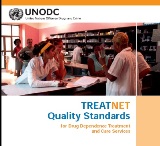
The TREATNET Quality Standards have been defined by a professionally and geographically diverse working group consisting of experts from the four regions where the UNODC TREATNET project—“Partnership for Action on Comprehensive Treatment (PACT)—Treating drug dependence and its health consequences” is being implemented.
More details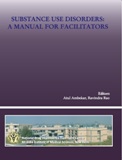
India has a sizable burden of substance use disorders.1 The treatment services for managing substance use disorders are few and far in-between. Thus, besides specialised drugtreatment centres (or ‘De addiction centres’) it would be important to enhance the opportunities for providing treatment services through general health care settings
More details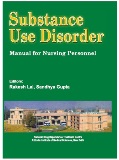
The Ministry of Health and Family Welfare appointed a commitee in 1976 to exmine the problem of drug abuse and suggest guidlines to combat it.
More details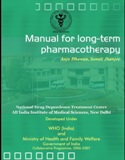
The Ministry of Health and Family Welfare has identified training of General Duty Medical Officers as an important priority area as lack of trained manpower is a barrier in providing services for Drug De-Addiction Programme. As a coordinating centre, several training programmes sponsored by the MOH & WHO (I) have been conducted and coordinated by the National Drug Dependence Treatment Centre at AIIMS
More details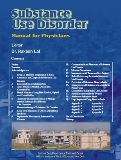
Substance Abuse is a complex problem having medical and social ramifications which impacts all social strata. It affects not only the user and their families but all sections of the society. Controlling substance abuse by way of demand reduction, provision of treatment services etc. has been a matter of priority for the Ministry of Health and Family Welfare for many years now
More details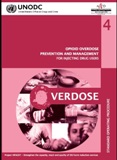
“Currently ‘Injecting Drug Users’ (IDUs) are referred to as ‘People Who Inject Drugs’ (PWID). However, the term ‘Injecting Drug Users’ (IDUs), has been used in this document to maintain consistency with the term used presently in National AIDS Control Programme”.
More details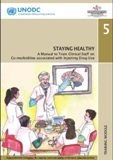
“Currently ‘Injecting Drug Users’ (IDUs) are referred to as ‘People Who Inject Drugs’ (PWID). However, the term ‘Injecting Drug Users’ (IDUs), has been used in this document to maintain consistency with the term used presently in National AIDS Control Programme”
More details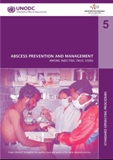
In India, Targeted Intervention (TI), under the National AIDS Control Program (NACP) framework, is one of the core strategies for HIV prevention amongst injecting drug users (IDUs). Apart from providing primary health services that include health education, abscess management, treatment referrals, etc., the TIs are also designated centres for providing harm reduction services such as Needle Syringe Exchange Program (NSEP) and Opioid Substitution Therapy (OST).
More details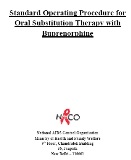
Under the National AIDS Control Programme, Phase III, Oral Substitution Therapy (OST) has been included in the comprehensive package of services to the Injecting Drug Users. After obtaining necessary approval, National AIDS Control Organisation plans to scale up this component. In this connection, a practice guideline for implementation of buprenorphine substitution has already been prepared.
More details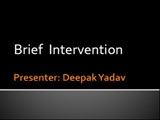
Brief interventions typically consist of one to four short counselling sessions with a trained interventionist.(e.g., physician, psychologist, social worker, nurse, health worker)
More details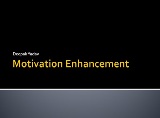
Enable the patient to compare his quality of life with other non users (friends and relatives), and help him to think where he is vis a vis where he wanted to be
More details
Making the family comfortable,Addressing them in culturally appropriate ways ,Identify and address each family member appropriately,Allow the family to ventilate their issues ,Assure family of confidentiality
More details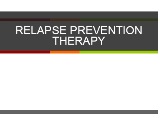
Lapse/relapse are an integral part of recovery, Provides an opportunity to strengthen client’s existing skills and teach new ones, First step- identification of high risk situations, Second step- avoid or deal with it
More details
Counseling is a professional interactive process between counselor and client.
More details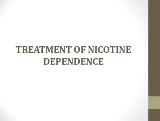
Most commonly used substance the world over.Largest cause of preventable death worldwide, Leading causes of smoking related death,Cardiovascular diseases,COPD,Lung cancer ,Other diseases associated with smoking
More details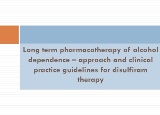
One of the oldest and time-tested treatments for alcoholism ,Sometimes incorrectly referred to as an “aversive agent.” ,Dose: 250 mg/day (oral) in majority of cases; 500 mg/day in some cases
More details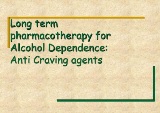
Neurotransmitters and Alcohol Dependence Opioids,Glutamate,GABA,Serotonin etc
More details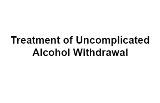
The symptoms in Criterion B cause clinically significant distress or impairment in functioning , The symptoms are not due to a general medical condition and are not better accounted for by another mental disorder.
More details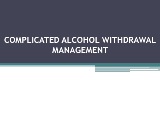
Alcohol withdrawal syndrome (AWS) usually mild – moderate in majority of patients , About 10% of patients have complications during AWS – complicated AWS
More details
Naltrexone (NTX) synthesized in 1965 , Eliminate drug carving and prevent relapse ,Approved for this purpose by US FDA in 1984,Approved for treatment of alcohol dependence in 1994
More details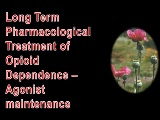
Opioid Dependence is a chronic, relapsing disorder Should be seen as a ‘chronic noncommunicable disease’.
More details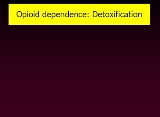
Detoxification: a process where a individual who is physically dependent on a drug is taken off the drug either abruptly or gradually
More details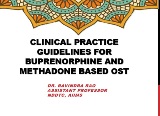
Some drug-drug interactions are observed between BPN and ART medications often not clinically significant to warrant change in dose of either BPN or ART medicines Guided by the clinical signs and symptoms for changing the dose of OST
More details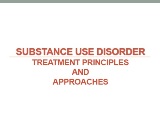
Drug dependence recognised as brain disorder and characterised by loss of control Drugs have long-lasting effects on the pathways in the brain Chronic drug use causes physiological derangements lasting years after the last drug taking episode.
More details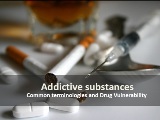
Terminologies in substance use : Important terms related to drug use and drug use disorders - Use,Harmful use, Dependence ,Addiction
More details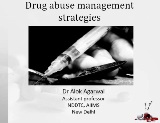
Control - manufacture and distribution of certain substances - to prevent diversion to use for recreational purposes ,Psychotropic substances with medicinal properties
More details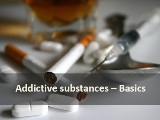
Addictive substances primarily act on a particular area/group of neurons in the brain.All substances acting on the brain are not addictive , Addictive substances primarily act on a particular area/group of neurons in the brain.
More details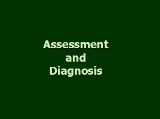
Assessment forms the first point of contact for the clinical staff with the client.
More details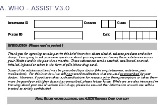
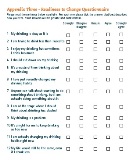
Format - download Please read the sentence below carefully. For each one please tick the answer that best describes how you feel. Your answers will be private and confidential.
More details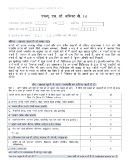
• World Health Organization
• SEARO World Health Organization – India
• UNODC
• UNODC – India
• Ministry of Health and Family Welfare, Government of India
• Ministry of Social justice and Empowerment, Government of India
• Ministry of Food Processing Industries, Government of India
• National Institute for Social Defence
• National Drug Dependence Treatment Center
• India Alcohol Policy Alliance
• Alcohol and Drug Information Center, India
• AIIMS OST



 Feedback
Feedback Sitemap
Sitemap